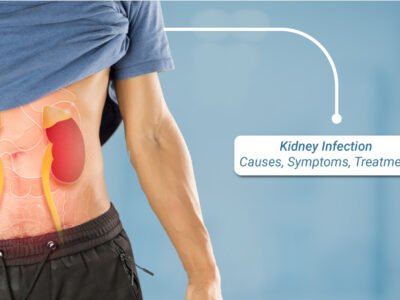Though the main function of your kidney is to remove waste products from your blood, the ancillary effects of this particular function are many. When the kidney is not able to perform the function of filtering the blood with complete efficiency, it is said to be in a state of failure. From this blog following things will be cleared: Definition, causation, types, consequences, symptoms, diagnosis, and treatment of kidney failure.
What is kidney failure?
One of the main functions of your kidneys is to remove the nitrogenous waste, excess fluids, and excess electrolytes from your blood. When a kidney is impaired to perform this function in a short period of time, the substances to be removed from the blood are increased in concentration. Due to this, the following things occur:
- Increase in the concentration of blood urea
- Increased serum creatinine values
- Decreased sodium level
- Increased potassium level
- Decreased calcium level
- Increased phosphate level
- Hypervolemia or Hypovolemia
Renal function tests during kidney failure
| Tests | Normal value | Value during Kidney Failure |
| Creatinine concentration | 0.8 – 1.3 MG/DL | >3 MG/DL |
| Urine output | 1 – 3 ML/KG/Hr | < 0.5 ML/KG/Hr |
What are the causes of kidney failure?
The potential causes of kidney failure can be various. The cause of kidney failure may determine the type of kidney failure a patient can get. Some major causes are as follows:
- Renal artery stenosis
- Extreme blood loss
- Heart failure
- Excessive diarrhea
- Glomerulonephritis
- Angiitis
- Tubular necrosis
- Stones
- Prostatitis
Based on the cause, kidney failure can be categorized into three categories:
- Kidney failure due to irregular blood supply
- Kidney failure due to diseases in the internal structures of the kidneys
- Kidney failure due to the constricted passage of urine
These categories are respectively in medical terms called:
- Acute pre-renal kidney failure
- Acute intrinsic kidney failure
- Acute post-renal kidney failure
What can happen to the kidney after a failure, if untreated
After a kidney is failed, it can move toward category loss. In this category, kidney failure becomes irreversible and untreatable. After this stage of kidney failure, a patient requires dialysis or a kidney transplant. This stage of kidney failure is called its end stage.
What are the symptoms of Kidney failure?
The symptoms of kidney failure are best understood by categorizing the signs and symptoms based on the cause of kidney failure.
For kidney failure due to irregular blood supply, symptoms are:
- Decreased blood pressure
- Fast heart rate
- Weak pulse
- Decreased jugular venous pressure
- Chronic dehydration
- Dull eyes
- Less urine output
- Diarrhea
For kidney failure due to disease in the internal structure of the kidney, symptoms are:
- Chronic sore throat
- Hypertension
- Blood in urine
- Heart failure
- Dark urine
- Cramps and pain in muscles
- Epilepsy
- High fever
- Joint pain
For kidney failure due to constricted passage of urine
- Irregular urine frequency
- Blood in urine
- Flank pain
Diagnosis of kidney failure
An early and accurate diagnosis of kidney failure can really help the patient to fully recover. As the early diagnosis is clear enough, what does an accurate diagnosis mean? It means to;
- First get the failed kidney recognized
- Then to evaluate the stage of kidney failure
- Lastly to map out the specific treatment plan for the evaluated patient.
Tests used for the diagnosis of kidney failure are:
- Blood electrolyte profile: to evaluate the urea, creatinine, potassium, phosphate, and calcium levels in the blood
- Analysis of urine: to mainly evaluate the urine volume
- Renal scintigraphy: to detect stones or enlarged prostate
- Kidney biopsy
Treatment of kidney failure
As it is very clear that the causes of kidney failure can vary too much, this leads to the fact that the types of kidney failure differ in symptoms and even diagnosis. Therefore, it is much more obvious to state that there is no one treatment for different types of kidney failures. Moreover, the success of the treatment of kidney failure really depends upon the precision of the diagnosis.
The most common treatments for kidney failure are as follows:
- Medications: Water pills (all three types), potassium binders, IV sodium bicarbonate, inotropic agents, immune suppressors, corticosteroids, and phosphate binders.
- Restrictions. Water and salt, foods containing potassium.
- Procedures: Fluid replacement, prostatectomy, removing stones, dialysis, transplant.
Conclusion
To analyze the deaths due to kidney failures in India, one would have to go through large statistical numbers. The most threatening data is that kidney failures have become the leading cause of premature deaths in India. The effects of Kidney failure are not only limited to the patients suffering from the condition but act as major setbacks for the family patient. As so many families are involved negatively with these rising conditions, our national population may be in an underlying collective medical danger of kidney failure. Therefore, it is in everyone’s good interest that the awareness about this matter of subject be prioritized. No doubt, your best source of information can only be your doctor, but the above content of this blog creates a map of everything that kidney failure constitutes.
Our nephrologists can help you to understand extensively about each aspect of kidney failure. So, contact us at Alfa Kidney Care for more information.


